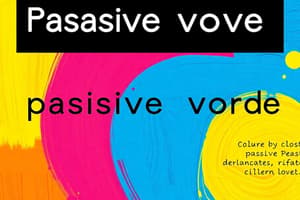Podcast
Questions and Answers
Which sentence correctly uses the Present Continuous to describe a temporary situation?
Which sentence correctly uses the Present Continuous to describe a temporary situation?
- She is studying French for the summer. (correct)
- We go to the gym every Saturday.
- They own a house in the countryside.
- My brother works in a bank.
Which sentence correctly uses the Simple Present to describe something that is always true?
Which sentence correctly uses the Simple Present to describe something that is always true?
- Water boils at 100 degrees Celsius. (correct)
- He is currently living in Spain.
- They are building a new school.
- The sun is rising in the east.
Which sentence uses the Present Continuous to describe a situation that is slowly changing?
Which sentence uses the Present Continuous to describe a situation that is slowly changing?
- I visit my grandparents every weekend.
- The train arrives at 9 AM every day.
- She is becoming more confident in her abilities. (correct)
- He always eats breakfast at 7 AM.
Which sentence uses the Simple Present to describe future events which are part of a timetable?
Which sentence uses the Simple Present to describe future events which are part of a timetable?
Which sentence correctly describes a habit using the Simple Present?
Which sentence correctly describes a habit using the Simple Present?
Which sentence uses the Simple Present to describe a state, considering that stative verbs are not typically used in continuous tenses?
Which sentence uses the Simple Present to describe a state, considering that stative verbs are not typically used in continuous tenses?
Which sentence appropriately utilizes the Present Continuous to express a future definite plan?
Which sentence appropriately utilizes the Present Continuous to express a future definite plan?
Choose the sentence that uses the Present Continuous to describe an annoying habit.
Choose the sentence that uses the Present Continuous to describe an annoying habit.
Flashcards
Present Simple: Truths
Present Simple: Truths
Used for things that are always true or general facts.
Present Continuous: Now
Present Continuous: Now
Used for actions happening right now, at the moment of speaking.
Present Simple: Permanent Situations
Present Simple: Permanent Situations
Used for long-term situations that are expected to continue.
Present Continuous: Temporary Situations
Present Continuous: Temporary Situations
Signup and view all the flashcards
Present Simple: Habits
Present Simple: Habits
Signup and view all the flashcards
Present Continuous: Temporary Habits
Present Continuous: Temporary Habits
Signup and view all the flashcards
Present Simple: Scheduled Future Events
Present Simple: Scheduled Future Events
Signup and view all the flashcards
Present Continuous: Future Plans
Present Continuous: Future Plans
Signup and view all the flashcards
Study Notes
- The difference between present simple and present continuous is outlined
Present Simple
- Used for things that are always true
- Water boils at 100 degrees.
- Used for situations that are permanent or nearly permanent, lasting a few years
- Julie lives in London.
- Used for habits or things done regularly
- I drink coffee every morning.
- Used for future events that follow a set timetable
- My plane leaves at eight tonight.
- Used to talk about the future after specific words like 'when', 'until', 'after', 'before', 'as soon as'
- I'll call you when I get home.
- Used to describe events in books, plays, and films
- At the end of the book, the detective catches the killer.
Present Continuous
- Used for actions happening at the moment of speaking
- The water is boiling now, so you can put in the pasta.
- Used for temporary situations
- Julie is living in Paris for a few months (usually she lives in London).
- Used for situations that are slowly changing
- I'm getting better and better at speaking English.
- Used for temporary or new habits
- I'm drinking too much coffee these days because I'm so busy at work.
- Used for annoying habits, often with "always"
- My flatmate is always leaving the kitchen in a mess!
- Used for definite future plans
- I'm meeting John after class today.
- Used to describe people in pictures and photos
- In this photo, my mother is walking beside a lake.
Important Note
- Simple present is used with stative verbs.
- Continuous tenses cannot be used with stative verbs.
Studying That Suits You
Use AI to generate personalized quizzes and flashcards to suit your learning preferences.




